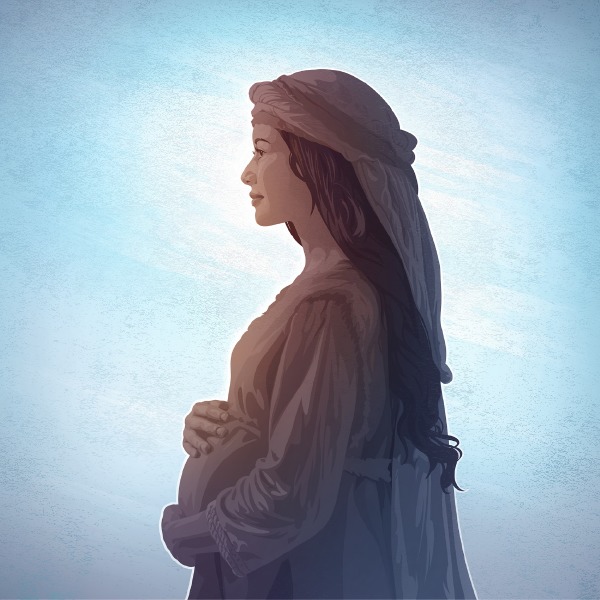
The story of Mary, also
known as Maryam in Islam, is one of the most revered and significant narratives
in both Christianity and Islam. Her life is portrayed in various sacred texts,
including the Bible and the Quran. I'll provide an overview of the key events
and aspects of the life of Mary:
Mary's Early Life and
Family Background:
Mary, the mother of
Jesus, was born in Nazareth, a small town in Galilee, during the first century.
According to Christian tradition, she was the daughter of Joachim and Anne, who
were devout and righteous individuals. Although not mentioned in the canonical
Christian scriptures, some ancient apocryphal texts provide details about her
upbringing and family.
Mary's Annunciation by
the Angel Gabriel:
In the Gospels of Matthew
and Luke, the angel Gabriel appeared to Mary to deliver a momentous message.
Gabriel greeted her, saying, "Hail, favored one! The Lord is with
you." He informed Mary that she had found favor with God and that she
would conceive and give birth to a son, whom she should name Jesus. Mary was
astonished but submitted herself to God's plan, responding, "Behold, I am
the handmaid of the Lord; let it be to me according to your word."
The Virgin Birth of
Jesus:
Mary's conception of
Jesus is described as the "Virgin Birth" or the "Immaculate
Conception." In both Christian and Islamic beliefs, it is considered a
miraculous event. Mary conceived Jesus through the Holy Spirit without any
involvement of a human father. This divine conception is central to the
understanding of Jesus' identity as the Son of God.
Mary's Visit to
Elizabeth:
After the angel's visitation,
Mary traveled to visit her relative, Elizabeth, who was also miraculously
pregnant with John the Baptist. When Mary greeted Elizabeth, the baby in
Elizabeth's womb leaped for joy. Elizabeth praised Mary, recognizing her as
"the mother of my Lord."
Mary's Magnificat:
In response to
Elizabeth's praise, Mary sang a hymn of thanksgiving and praise known as the
"Magnificat." It reflects Mary's humility and her understanding of
God's role in her life and in the lives of the oppressed and marginalized.
Mary's Marriage to Joseph
and the Birth of Jesus:
Mary was betrothed to
Joseph, a righteous man from the house of David. Before they could live
together, Mary's miraculous pregnancy became known. However, Joseph, guided by
an angel in a dream, accepted the divine nature of her conception and married
her. Mary and Joseph traveled to Bethlehem, where Jesus was born in a stable
and placed in a manger.
The Adoration of the
Shepherds and the Wise Men:
Following Jesus' birth,
shepherds visited the newborn child after being informed by angels. Later, Wise
Men (Magi) from the East arrived in Jerusalem, guided by a star, seeking the
newborn King of the Jews. They presented him with gifts of gold, frankincense,
and myrrh.
The Flight to Egypt:
To escape King Herod's wrath,
who sought to kill the newborn king, an angel warned Joseph in a dream to flee
to Egypt with Mary and Jesus. They lived there until Herod's death, fulfilling
the prophecy, "Out of Egypt I called my son."
Mary's Life in Nazareth:
After returning from Egypt,
Mary and Joseph settled in Nazareth, where Jesus grew up. Mary is depicted as a
devoted and nurturing mother, raising Jesus with love and care.
Mary at the Wedding at
Cana:
The Gospels recount that
Mary was present at the wedding feast in Cana. When the wine ran out, she
interceded on behalf of the hosts, prompting Jesus to perform his first
recorded miracle, turning water into wine.
Mary at the Crucifixion:
One of the most poignant
moments in Mary's life is her presence at the crucifixion of Jesus. Standing
near the cross, she witnessed the agonizing death of her beloved son. According
to Christian tradition, Jesus entrusted her care to the disciple John, saying,
"Woman, behold your son," and to John, "Behold your
mother."
Mary in the Early Christian
Community:
After Jesus' resurrection
and ascension, Mary was part of the early Christian community in Jerusalem. The
Book of Acts mentions that she was among those present at the gathering of the
disciples and followers after Jesus' ascension.
Mary in Islamic
Tradition:
In Islam, Mary is highly
revered as one of the greatest and most righteous women. The Quran dedicates an
entire chapter (Surah) to her, titled "Maryam" (Mary). It narrates
her piety, her miraculous conception of Jesus, and the circumstances of his
birth. The Quran portrays Mary as a devoted servant of God and a symbol of
purity and devotion.
Mary's Assumption:
In Christian tradition,
there are beliefs about the Assumption of Mary, which suggest that she was
taken bodily into heaven at the end of her earthly life. However, these beliefs
are not present in Islamic tradition.
Legacy and Veneration:
Throughout history, Mary
has been venerated by Christians and Muslims alike. In Christianity, devotion
to Mary, often referred to as "Marian devotion," includes prayers,
hymns, and celebrations such as the Feast of the Assumption and the Feast of
the Immaculate Conception. In Islam, Mary is celebrated for her piety and
submission to God's will.
Mary's story serves as a
source of inspiration, symbolizing faith, humility, and devotion. Her life,
filled with challenges and divine encounters, continues to resonate with
believers of different faiths, who find comfort and guidance in her example of
unwavering faith and dedication to God.


